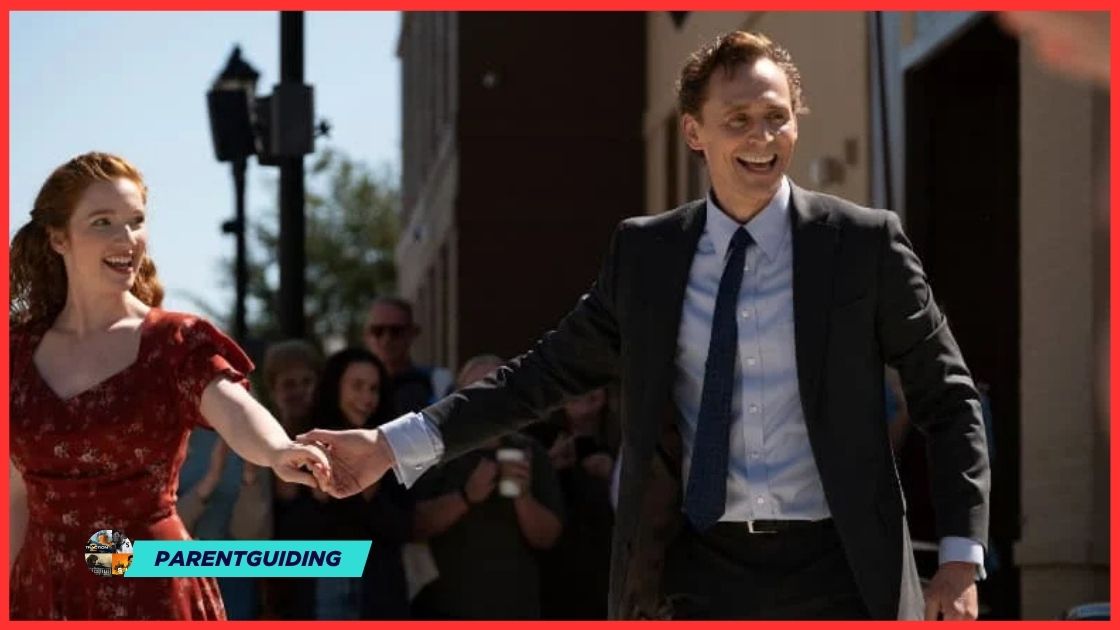The Life of Chuck is Rated R by the Motion Picture Rating (MPA) for language.
The Life of Chuck Review:
“We all die. The goal isn’t to live forever; the goal is to create something that will.”
That’s not a line from The Life of Chuck, but it might as well be. Mike Flanagan’s latest film is a curveball—gentler, more intimate, and more spiritually aching than anything he’s done before. It’s not horror. It’s not even especially dramatic in the traditional sense. But it is human. Quietly, defiantly human.
And in that way, it may be the most haunting thing he’s made yet.
The Movie Story Plot
Based on a trio of interlinked stories from Stephen King’s If It Bleeds, The Life of Chuck is structured like a novel in reverse. We begin at the end, work our way backward through Chuck’s adult life, and finally land in childhood, when the seeds of something much larger were quietly being sown.
Chuck (Tom Hiddleston) is, on the surface, just a guy—a mild-mannered everyman whose presence has somehow stitched meaning into the lives of others. As the world begins to inexplicably unravel—storms raging, reality cracking at the seams—people start noticing tributes to him everywhere. Billboards. TV ads. “Thanks for 35 great years, Chuck.” No one knows who he is or what he did, but his absence is being mourned before it’s even fully understood.
If that sounds surreal, that’s because it is. But the surrealism masks something quietly devastating: The Life of Chuck is about mortality. Not just the big, flashy death at the end of things, but the little deaths we endure through time. The erosion of memories, the slipping away of people, the fear that none of it meant anything. It asks: what makes a life meaningful? And—just as importantly—what do we leave behind when we go?
Tom Hiddleston plays Chuck with a warmth and simplicity that’s almost disarming. He’s not meant to be complicated, and that’s the point—Chuck is everyone. He’s your teacher, your coworker, your dad, your friend. Hiddleston resists the urge to overplay him, instead embodying the kind of everyday grace most people never notice until it’s gone.
Chiwetel Ejiofor and Karen Gillan, as Marty and Felicia in the film’s apocalyptic opening act, give quietly moving performances as two people trying to keep it together as the world falls apart. Their scenes—watching old movies, holding onto slivers of normalcy—are among the most affecting in the film. There’s a tenderness to their fear, a desperation to find meaning, that lingers long after the credits.
And then there’s Mark Hamill. As Chuck’s cantankerous grandfather in the film’s final act, he brings both gravitas and a gruff humor. He doesn’t have a ton of screen time, but he makes it count—especially in a key monologue about inevitability that ties the film’s themes together beautifully.
Flanagan has always had a gift for stillness—the kind that lets emotion bloom in silence—and he brings that same eye here. This is not a film of jump scares or plot twists. It’s a film of glances. Empty streets. A girl rollerskating at night. A man watching a black-and-white musical while the world crumbles outside his window.
The pacing is gentle, sometimes even meandering, but intentionally so. The Life of Chuck isn’t interested in urgency. It’s interested in presence—in soaking in a moment before it slips away. Cinematographer Michael Fimognari (a frequent Flanagan collaborator) bathes each section in warm, nostalgic light, evoking memories that feel like dreams even as they unfold onscreen.
Flanagan resists easy sentimentality, even as the film leans deeply into emotion. Yes, there are dance sequences. Yes, there’s a sense of melancholy whimsy. But it never feels manipulative. It feels earned.
It’s difficult to pin this film to a single genre. It has the structure of speculative fiction, the mood of a character drama, and the soul of a eulogy. For fans expecting another Midnight Mass or Haunting of Hill House, this may feel like a departure. But the same questions echo through it all: What happens when we die? What lingers after we’re gone? Can connection survive the inevitable?
More than anything, The Life of Chuck is a vibes movie. If you’re not in the mood for reflection or slow-burning introspection, this might feel aimless. But for those willing to sit with it—to let it breathe—it’s deeply rewarding.
There are echoes of Stand By Me here. Of The Green Mile. Even of Magnolia, in how it weaves lives together with a kind of spiritual serendipity. But this is very much its own quiet animal.
High Recommended:
The Life of Chuck Parents Guide
Violence & Scary Elements: The Life of Chuck contains almost no violence in the traditional sense. There are no physical fights, no blood-soaked scenes, no creepy spirits crawling out of mirrors. But that doesn’t mean it isn’t scary. It is—just not in a jump-scare way.
The fear here is existential: a world on the brink, an unexplained 9.0 earthquake, rolling blackouts, and characters reacting to it all with increasing dread. If you’ve ever experienced climate anxiety or lived through a major crisis (so… most of us by now), this might hit close to home. There’s an eerie realness to how it unfolds—people trying to cling to normalcy while knowing it’s all slipping through their fingers. No horror. Just quiet terror.
Profanity: The language isn’t constant or excessive, but there are definitely a handful of strong words dropped throughout—F-bombs and other colorful expressions appear mostly in moments of stress, fear, or resignation. The tone isn’t aggressive or vulgar for shock value, but more naturalistic—people reacting the way real people might when the sky is literally falling. If your bar for R-rated dialogue is The Wolf of Wall Street, rest easy. This is tame in comparison.
Substance Use: There’s the occasional drink shown, but it’s minimal and never glamorized. No drugs, no partying. Again, not that kind of movie. If anything, the characters here are too busy trying to process the meaning of their lives to get drunk.
Sexual Content & Nudity: Absolutely none. Zero. Nada. Which is, honestly, refreshing. This film is about connection, but not the physical kind. It’s emotional, spiritual, metaphysical. You could show it to your grandmother without a blush.
Age Recommendation: 17+ (but only if they’re emotionally ready for it).
Final Thoughts & Recommendation
The Life of Chuck is not for everyone. It’s slow, contemplative, and deeply sentimental in a way that may not click with audiences looking for more plot-driven fare. But for those attuned to its frequency—those of us quietly wrestling with time, memory, mortality—it might just hit like a freight train.
It’s a story about death that’s really about life. About choosing joy in the face of dread. About the miraculous, fleeting beauty of being known—really known—by the people around us.
In a world obsessed with spectacle, Flanagan has given us something rare: a compassionate whisper of a film. One that says, “I see you. I get it.”
And sometimes, that’s exactly what we need to hear.
Director: Mike Flanagan
Writers: Mike Flanagan, and Stephen King
Stars: Tom Hiddleston, Jacob Tremblay, and Benjamin Pajak
Release date: June 6, 2025 (United States)
Rating: 8.5/10

I am a journalist with 10+ years of experience, specializing in family-friendly film reviews.
